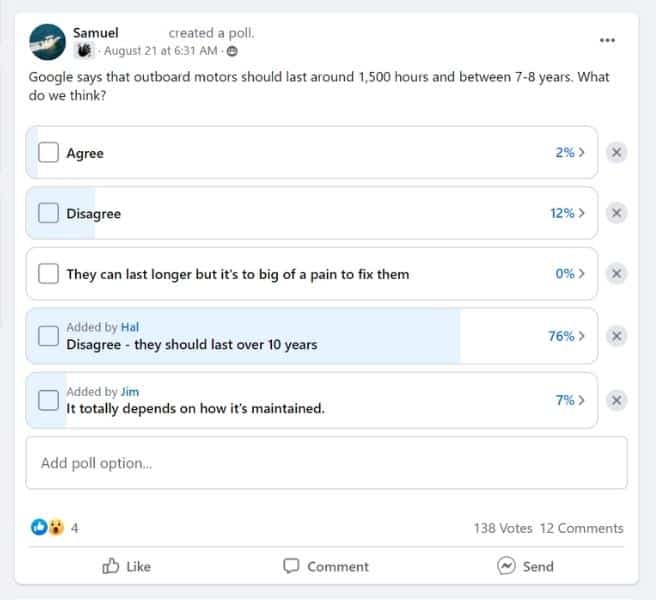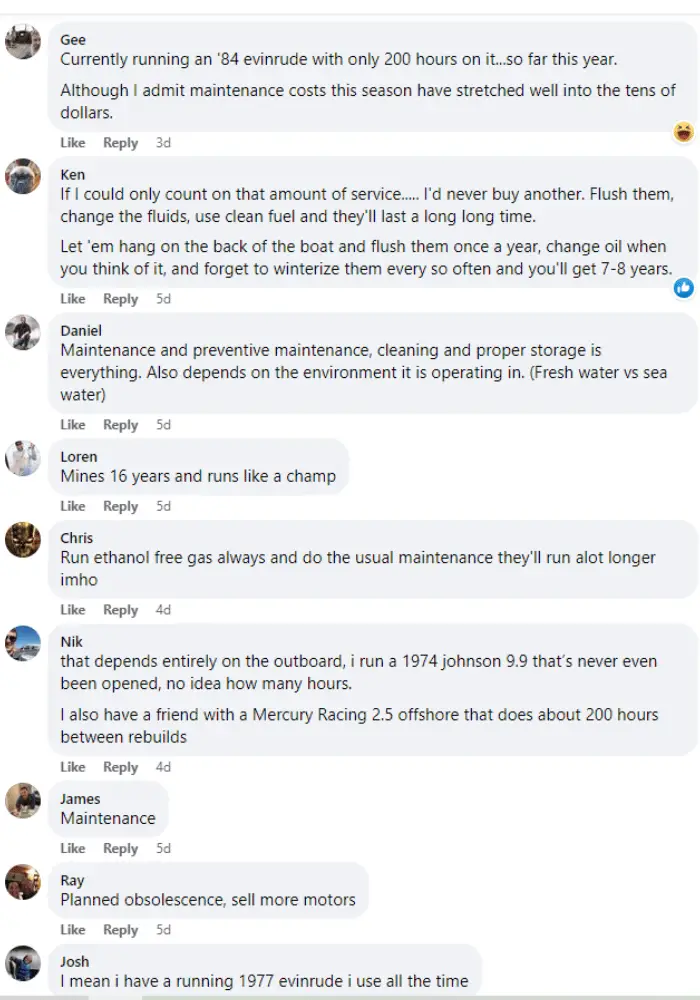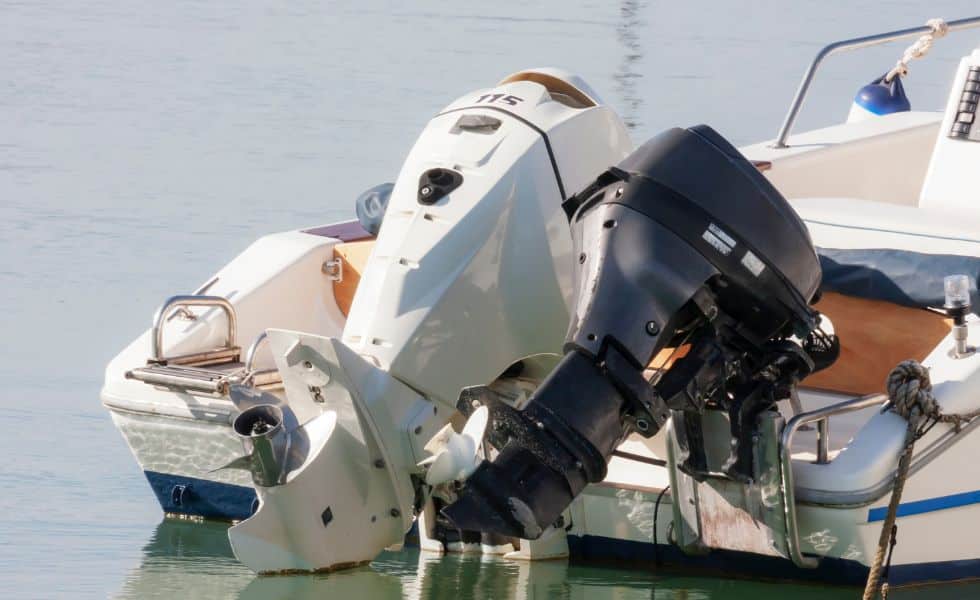Outboard motors are becoming more and more popular, and new innovations are starting to make them the most popular boat motor type. However, an important question that needs to be asked is: how long do outboard motors last?
Outboard motors last around 1,500 hours and 10-15 years if they are maintained correctly and are not overly abused (this is a big if). Eventually, there comes a point where repairing them is not worth it anymore, and most would rather just buy another motor.
Abusing them may mean running them dry, not flushing them with fresh water, not changing the oil and other fluids as frequently as you should, not winterizing them, etc. Abusing an outboard could also mean not ever using it. Marine engines are meant to be used, so going weeks or months at a time without using them will harm them unless the engine is winterized.
In order to get a better understanding of what others thought about this topic, I asked a very active boating Facebook group what they thought of the current Google result for this question. Here were the results:

It’s important to note that the term “last” in the question “how long do outboard motors last” is subjective. If after 6 years, your engine starts giving you issues and the mechanic says it needs a $2,000 repair, some may just get a new engine right then and there, while others may repair it and continue to use it for longer.
So how long an engine lasts also depends on the person. If someone owns a company that needs their outboards to be 100% reliable at all times, they will probably go through more outboards than someone who just uses their boat on the weekends.
How to make outboard motors last longer
It may sound like a pain in the rear, but owning a boat means keeping up with maintenance and paying attention to how you use and store your boat. It’s just a part of boat ownership, like it or not.
Below are some basic things you can do and keep in mind to extend the life of your outboard motor. The more of these things you do and the more attention you take to it, the longer your motor will last.
If you routinely do these things, it’s not crazy to think you can have an outboard for 15 to 20 years that runs great every time.
Routine maintenance
Maintenance is a major key to prolonging the service life of your outboard motor. For starters, changing the engine oil every season will dramatically extend the life of your motor and prevent accelerated wear on the engine parts.
Some marine engine experts even recommend changing your outboard’s engine oil every 50 hours or every six months (whichever comes first). Doing this can add possibly thousands of additional hours to life of your motor.
In addition to oil changes, make sure to follow the maintenance guidelines from your outboard’s owner’s manual. Maintenance needs will be outlined and show at what intervals these need to be done. These include things such as regreasing certain parts, changing lower unit oil, and replacing fuel filters among other things.
Another important element to outboard maintenance is keeping an eye out for corrosion. Once corrosion gets too bad, it can take over the engine and result in the need for some serious repairs. Regular oil changes will help combat corrosion internally, but make sure to inspect other parts for corrosion before it becomes a lost cause.
Related article: Boat Maintenance Simple Guide: Checklist, Costs, Tips
Winterizing
Winterizing is also a good habit to get into, especially if you live in a temperate climate where your boat will be sitting unused in the cold for several months.
Even if you live in a year-round warm climate, winterizing is a good thing to do. If you have any kind of off season where you won’t be using your boat for an extended period of time, winterization is a good idea.
To winterize, make sure to change the oil and oil filter, flush the motor with antifreeze (if below freezing temperatures are expected), and add stabilizing fuel additive to any remaining fuel. If possible, you should expel all fuel from the engine.
It’s also a good idea at this time to change the lower unit oil and add fogging oil to the cylinders. When spring has arrived and you’re ready to take your boat on the water again, make sure to run the motor at idle for a good while. This will allow the oil that has settled to run through the engine and go where it needs to.
Taking the extra time and energy to properly winterize can do wonders for extending the life of your outboard motor, so make sure to take your time to do it right.
Related article: Winterizing A Boat: What You Need To Know
Using quality fuel
Fuel can make or break the life of an outboard motor. If you use fuel with too many additives or fuel that’s gone bad, it can potentially ruin your motor.
Firstly, avoid if at all possible ethanol added gasoline. Ethanol is not great for small engines such as outboard motors and will cause corrosion and other problems. If you absolutely cannot avoid ethanol, never use gas with more than 10% ethanol.
Bad gas can also be a problem, especially if you’ve let it sit in the engine for a long time. If possible, disconnect the fuel line from your motor and allow the engine to run until it has burned up all the gas in the engine. This will keep the internals free from excess corrosion and will make using your motor after it has been sitting much easier.
Related article: What Fuel Do Boats Use? (All Fuel Types Explained)
How often you run your outboard
How frequently you run your outboard can also make a huge difference in the service life of your engine.
Running your outboard infrequently will cause more problems than not. If your motor sits for a long time, corrosion can build up and the oil will settle, causing a lot of wear and tear the next time you use it.
If you can, don’t just run your outboard only a few times a year. Try to take your boat out on the water as often as you can, even if it’s just for a short cruise, it will keep the motor running smoothly.
How you run your motor can also dictate the life of your outboard. Frequent stopping and starting, long periods of idling, and sudden repeated changes in RPMs will not help your motor last any longer.
Taking care of your outboard to make it last longer involves all aspects of boating, from maintenance, storage, and how it’s used on the water. Paying attention to all these aspects is the key to adding years to the life of your outboard.
Comments from other outboard owners
From the Facebook poll I made where I asked a group of boat owners “Google says that outboard motors should last around 1,500 hours and between 7-8 years. What do we think?”. Here is what people commented:

Which outboard motor brands last the longest?
How long an outboard motor lasts relies heavily on how its taken care of by its owner. An outboard from a great brand won’t last long if poorly taken care of, and a less quality brand motor can still last a long time if its meticulously cared for.
However, there are a few brands that come to mind that are revered for their tendency to last a long time, and if they’re properly maintained, they can seemingly last forever.
Outboard motor brands such as:
- Yamaha
- and Honda
are well known for reaching high hours without serious repairs. Other brands like Mercury and Evinrude can also last many years if properly taken care of.
Regardless of brand, the life of an outboard really comes down to how much it’s used and how well it’s taken care of.
Two stroke vs. four stroke outboards
There isn’t a significant difference in the hours of service life possible with four stroke motors vs. two stroke motors. If each is properly serviced and used, they can reach similar years of use.
It’s generally accepted that two stroke motors last longer than four stroke motors, but this is mostly because two stroke motors are much easier to maintain. Two stroke motors can be repaired quickly and cheaply, and because the lubricant is added to the fuel, it makes it a simpler design that involves less possible parts that can break.
Either way, two stroke motors are a dying breed, so unless you get your hands on a used two stroke whose days are already numbered, you’re stuck with a four stroke.
Saltwater vs. freshwater
Saltwater is extremely corrosive. Even parts of the motor that aren’t in direct contact with saltwater can fall victim to the corrosive effects of saltwater just by being around it.
Its safe to say outboard motors that primarily operate in saltwater will not last nearly as long as outboards that primarily operate in freshwater. To mitigate this, special attention should be placed on flushing the engine with freshwater immediately after being run in saltwater.
Also, motors that sit in water for extended periods, whether fresh or saltwater, will not last as long, but this is especially the case for saltwater.
Related article: Saltwater vs Freshwater Boating (Ultimate Guide)
Diesel vs. gas outboards
Diesel outboard motors are gaining popularity. This may be due in part to the fact that they inherently last longer than gasoline-powered outboards.
Since diesel is a type of oil, it lubricates as its used, which further protects the engine from wear and tear. In general, diesel outboard engines will last an additional 1000 hours longer than gasoline motors.
Conclusion
Owning an outboard motor comes with a level of responsibility if you want to get the most out of it. The expense for acquiring one requires a serious investment, so doing the right things to protect it will save you money over time and prolong your boating adventures.
As long as you keep these things in mind about maintenance, the different considerations based on how you store your motor, and paying attention to the condition of parts, you can expect to have an outboard motor for many years to come.
- What Is The Cheapest Way To Store A Boat? - February 28, 2023
- Do Boats Need Bottom Paint? (Uncovering the Truth) - February 2, 2023
- How Much Is Bass Boat Insurance? (Real Quotes) - January 18, 2023

